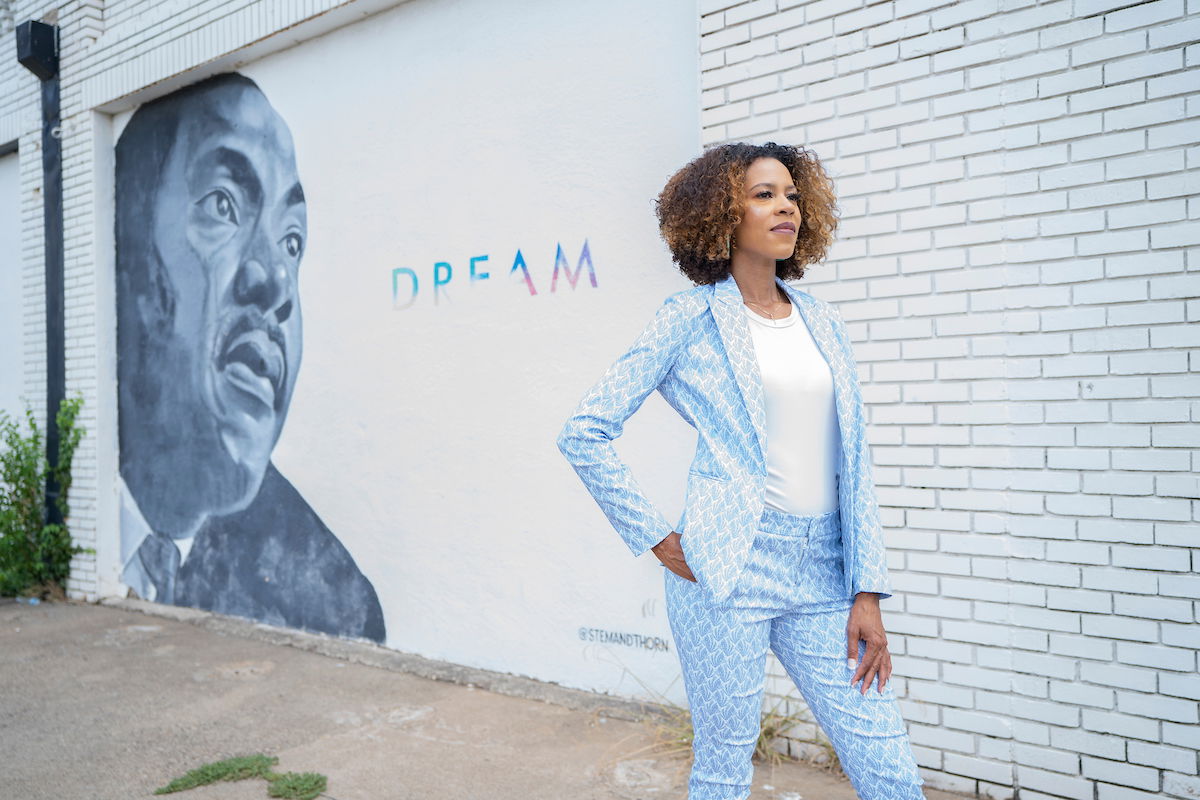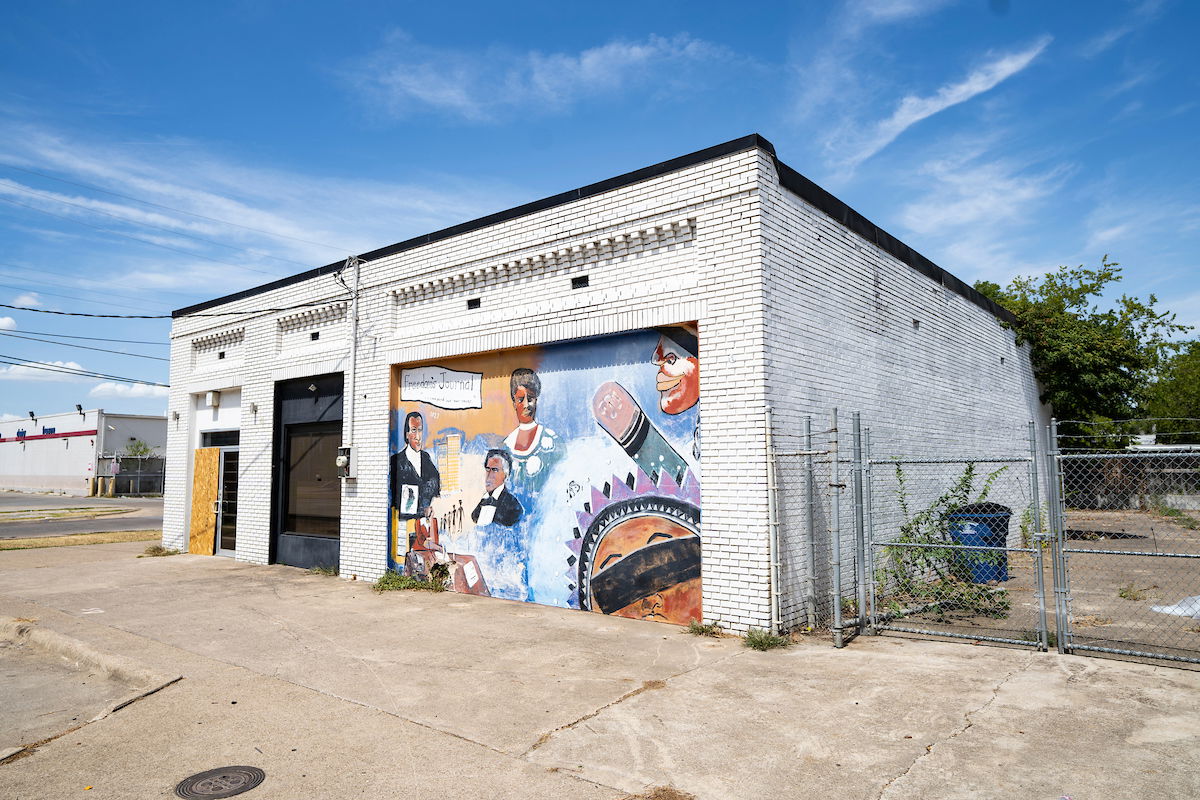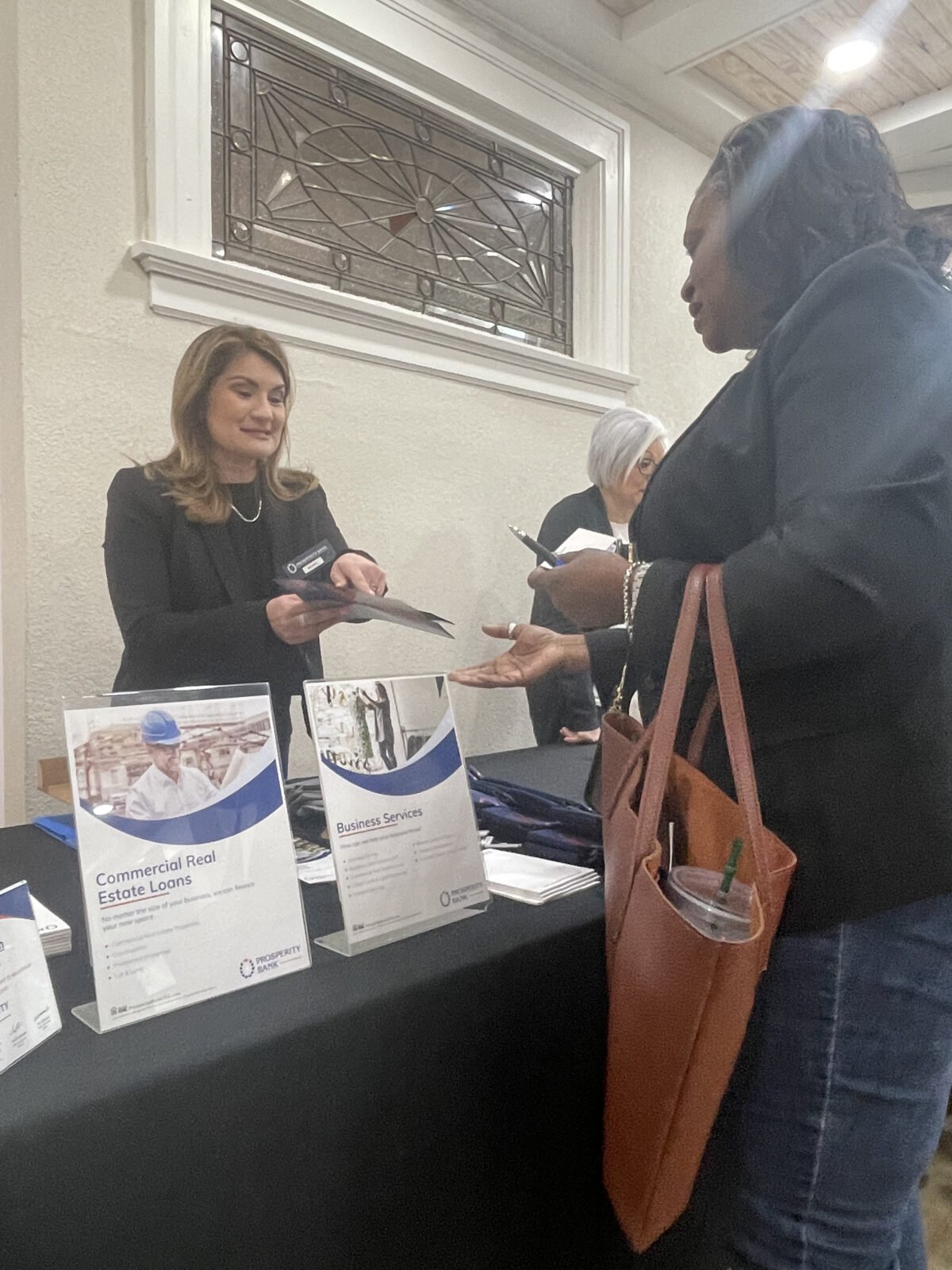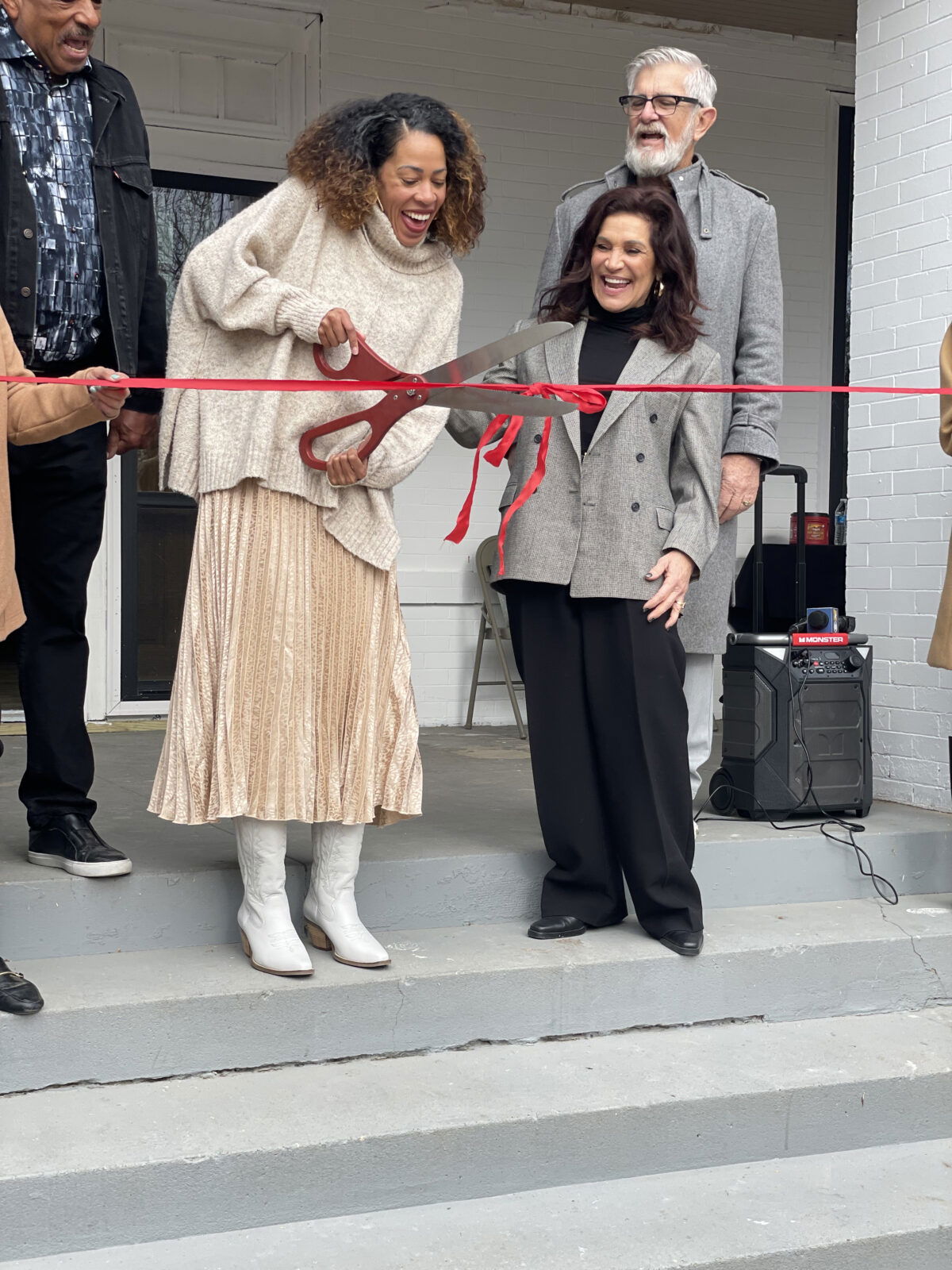On a January morning, Ferrell Fellows stands outside her new real estate office building on Martin Luther King Boulevard in South Dallas. A cold, gentle rain falls as people walk up the cement steps into the almost 100-year-old house for the grand opening of her new workspace.
“We wanted it to be completely done, but we didn’t want to rush it,” says Fellows, founder and CEO of Kingdom Legacy. “Everything in the property needed to be redone. But, I could see the potential of what it could be, and it has come so far.”

Inside, bankers from Prosperity, Cross Country Mortgage and Trinity Capital meet with prospective homeowners while hammering and painting continues in the background. Fellows bought the property six months ago, envisioning the space as a real estate development hub for transforming Martin Luther King Boulevard into a bustling retail center focused on the neighborhood’s needs, while preserving affordable housing for the larger South Dallas community.
“My team will be able to help buyers, sellers and investors in this area,” Fellows says.
Kingdom Legacy is a for-profit real estate company, but Fellows says she hopes to pioneer a communal approach to development in low-status and disinvested communities.
Her business model is simple: She buys off-market properties in South Dallas in need of serious repairs then renovates these homes, preserving character and history. They become residences for first-time homebuyers, long-term rentals for people not ready to take that leap, and shared housing for people she comes across in her community work, everyone from single parents to immigrants to prostitutes.
Fellows believes everyone deserves a dignified way to live.
Fellows and her husband also live in South Dallas and send their son to a Dallas ISD public school in their neighborhood. Her holistic view of neighborhood development includes plans to open a wellness center on Martin Luther King Boulevard with help from the City of Dallas’ economic development fund. The healthy food restaurant and fitness center are slated to open later this year.
“My core focus is housing, homeless solutions, and health and wellness, because when I look at the community, those are the core needs of South Dallas,” Fellows says.

Fellows grew up in Dallas in the 1990s but left for 10 years. She graduated from Florida A&M University and worked in the financial world before returning to the Cedars neighborhood near South Dallas to get married and raise a family.
She stumbled into real estate in 2016, and found she related to clients who were first-time home buyers, typically from low- to moderate-income households. She saw quickly how buying a home and owning property could impact a person’s financial future.
“I started to see over time that one decision made a huge impact on their net worth, on their ability to attain loans and start businesses,” Fellows says. “It changed their financial landscape in a matter of two to three years.”
Fellows says she watched families sell their homes and be able to cash in $100,000-plus in earnings in a very short amount of time.
“These were families that were teachers, people working at staffing companies, and hourly wages,” Fellows says. “I started to see them graduate to different levels of life based on ownership.”
Fellows says she became focused on this idea that home ownership can bring people out of poverty. Aware of the homeownership gap between Black and Latino communities and white Americans, Fellows says she focused on this “untapped” or often “ignored” market.
A 2020 National Community Reinvestment Coalition Home Mortgage Report found home loan originations to “majority-minority” neighborhoods declined to 18.5% that year, from 19.1% in 2018. January 2022 data also shows that the homeownership gap between Black and white Americans is currently the widest it’s been in 100 years.
As Fellows built her clientele of first-time homebuyers, she also found a great need in the community for affordable rental housing in the community, especially for people in need like the unhoused.
“When I heard the personal stories of people on the streets, it created a personal responsibility to do something about it,” Fellows says.
Fellows says she’s done her homework finding nonprofits and other housing solution organizations like RoommateMe Network and Seattle-based Housing Connector to help subsidize costs. Both tech platforms connect clients to property owners who will accept federal housing vouchers toward rent, and offer protections to owners like Fellows who may be taking a risk on clients who don’t meet the typical qualifications, such as providing the first and last month’s rents, which most rental agencies require.
Some of Fellows’ housing allows renters to live in a remodeled home renting a room and bathroom, and sharing a kitchen with other renters.
“We give them dignified housing at a very high quality at a lower-than-market rate,” Fellow says. “My business didn’t start to thrive until I started to give back to others.”

There’s a gap in the DFW market for individuals and community organizations who want to pursue this kind of “community-anchored development,” says Maggie Parker, the founder and managing partner of Innovan Neighborhoods, a real-estate consulting firm focused on improving neighborhoods through community partnerships.
“In Dallas, we have incredible expertise in both real estate and community engagement, but a huge divide when it comes to linking that expertise to yield successful and sustainable community-driven projects,” she says.
That’s why she started Community Developers Roundtable, a collective network of developers of color who are making community impact deals in Dallas. Fellows is one of 15 developers in the group.
“I would say there’s a lot of discussion around community impact, but not a lot of people who are executing,” Parker says. Fellows does “more than most” developers in “providing a lot more resources in moving deals forward,” she says.
Back inside Fellows’ new office space, more than 65 people crowd the first floor to hear her speak about her book “We Must Own: Beginner’s Guide to Real Estate Investing” that talks about how to build generational wealth from home and property ownership.
Trevor Turnbo, president of Trinity Capital Bank’s Dallas branch on Riverfront Boulevard, says “this shows how big of a potential market it really is, when that many people care and are interested enough to show up on a Saturday to listen about what it takes to buy a home.”
Turnbo says Fellows has tapped into a “viable market that’s definitely been ignored.” And, while he admires Fellows for her altruism, that’s not the reason his bank is working with her.
“There’s definitely good, profitable customers in that part of Dallas,” Turnbo asserts.
After Fellows’ talk, bank personnel walk attendees through the home buying process, and the event ends with Pastors Becky and Jim Hennesy from Trinity Church Cedar Hill talking about their new foundation, designed to help people with closing costs. Becky Hennesy met Fellows less than 2 years ago, and with aligned missions to help people own homes, they began to work together.
“My husband and I have been in the south Dallas county area for 30 years,” Hennesy says. “We’re not millionaires, we are not wealthy, but we have lived the life of generosity, and we have the reputation of being true to our word.”

Hennesey says her best friend lost her son in a car accident, and a few years later lost her husband to cancer. Two days after her husband died, the woman’s landlord evicted her from her home.
“That process awakened for me the difference the stability of home ownership meant to people, compared to being at the whim of a landlord,” Hennesy says. “How many people, with a little bit of credit help and financial help, could become homeowners.”
For her 65th birthday last December, Becky and Jim created the Hennesy Foundation, dedicated to raising funds to help people in southern Dallas with closing costs.
Fellows says often the biggest barrier to buying a home is the $5,000 to $7,000 people need for closing costs.
Malachi Broadnax, 25, stands in the back of the room listening to Fellows speak. He started looking into buying a home in South Dallas just a few months ago. He lives in an apartment on Malcolm X Boulevard.
Fresh out of college, Broadnax says he’s still working to qualify for a house loan.
“I’m getting there,” Broadnax says. He works full-time in IT for Legend Networking and Telecom. “I just see the revenues and possibilities that it can create in long-term situations.”
Fellows says living, working and volunteering in South Dallas opened her eyes to the needs of the community. In the last few years, she has moved further south in the community. She and her husband send their son to a public school in South Dallas.
Fellows also plans to open a wellness center on Martin Luther King Boulevard with help from the City of Dallas’ economic development fund. The healthy food restaurant and fitness center are slated to open later this year.
“My core focus is housing, homeless solutions, and health and wellness because when I look at the community, those are the core needs of South Dallas,” Fellows says.
At the open house, Hennessy says they received 26 applications for help with closing costs. Six weeks later, two people are very close to buying their first homes.

Could you send me address so I can come speak with you